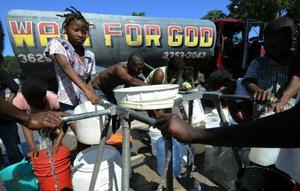Public healthCholera threatens to engulf Haiti
The cholera epidemic continues to spread unabated in Haiti; until this weekend the epidemic was co confined to rural Haiti and to the tent camps, erected after the earthquake earlier this year, which house 1.3 million Haitians; on Sunday it was revealed that the first 30 patients in Port-au-Prince, the capital, were admitted to hospitals for treatment; the situation in the country have gotten worse after Hurricane Tomas brought heavy rains last week; NGOs and international relief organizations have been attempting to get clean drinking water to those areas worst- affected by the storm, which triggered flooding and mudslides; the Haitian government appealed to donors for $19 million to cover urgent humanitarian needs

Water delivered in an attempt to stop the spread of cholera // Source: boston.com
The cholera epidemic in Haiti continues to spread unabated, with the death toll reaching544 yesterday (Monday). About 8,000 cholera patients are also in hospitals, with growing concerns that the disease will spread to the capital Port-au-Prince.
An aid organization told the BBC that it is treating at least thirty suspected cholera cases in the city.
The death toll from Hurricane Tomas has reached twenty, with thirty-six injured and eleven missing, officials said. The number of those killed by the cholera epidemic on Monday rose to 544 from 501 on Sunday and 442 on Wednesday.
Authorities fear that the outbreak could worsen after Hurricane Tomas brought heavy rains last week.
Local authorities and relief agencies have been attempting to get clean drinking water to those areas worst- affected by the storm, which triggered flooding and mudslides.
There was flooding in Leogane, Les Cayes, Jacmel and Gonaives, while many mountain towns have been cut off by flooded roads and landslides.
Susan Barry, from the aid organization Christian Aid, says people in the Leogane area are using brooms and shovels to remove the worst of the thick mud.
Barry says, however, that the main concern is that the flooding could result in the outbreak of cholera, with people forced to drink contaminated water and lacking access to basic sanitation.
The Artibonite River, believed to be a source of the outbreak of the epidemic in October, flooded over the weekend. People living along the river were asked to evacuate the area.
The hurricane passed without destroying the tented camps in and around Port-au-Prince, which house about 1.3 million survivors of January’s earthquake.
There are fears, though, over the increased risk of cholera in the capital. Haitian officials have not confirmed the presence of the disease in the city, but there has been concern that it is spreading.
The BBC’s Laura Trevelyan reports a leading specialist medical agency has told her that it is treating at least thirty suspected cholera cases in the capital.
In Port-au-Prince’s biggest slum of Cite Soleil, Dr. Kara Gibson of the American charity Samaritan’s Purse also told our correspondent that she has seen people with symptoms of the disease.
When visiting the slum, the BBC correspondent was told by two patients suffering from severe vomiting and diarrhoea that people had died from cholera in their neighborhoods.
Cholera itself causes diarrhoea and vomiting, leading to severe dehydration. It can kill quickly but is treated easily through rehydration and antibiotics.
On Friday, Haiti’s government and the United Nations appealed to donors for nearly $19 million to cover urgent humanitarian needs.
